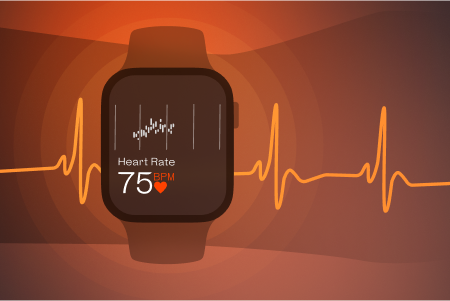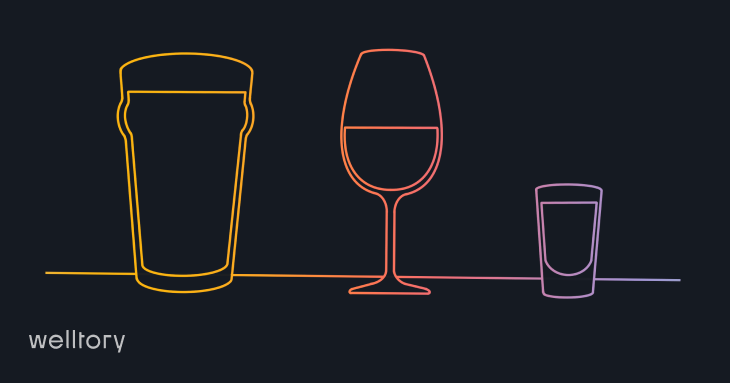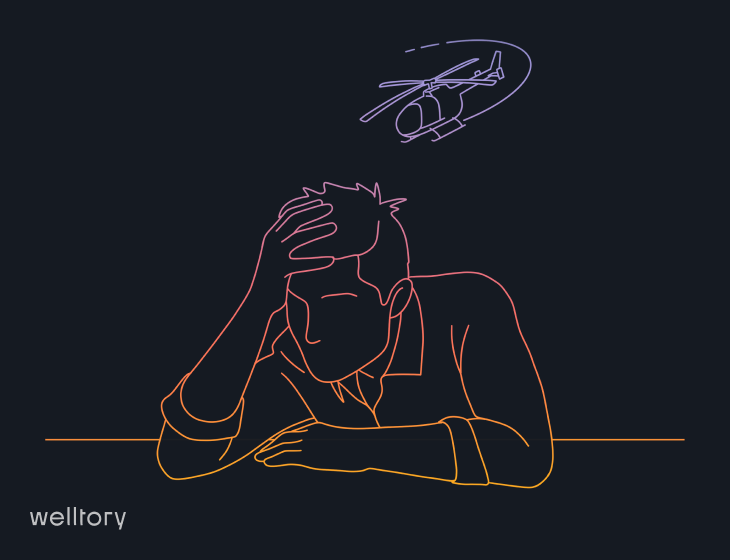


Welltory — All-in-One Wellness App.




Home » Habits & Addictions » Hangover app & how to track the impact of alcohol on health with Welltory

Unfortunately, there is no magic hangover app that can help you avoid a hangover or ease its symptoms. The only real solution is to avoid drinking or take some preventive measures such as drinking enough water and having some proper food as the party night evolves. We are not going to tell you to stop having alcohol at all but are going to empower you with the knowledge that might help you understand hangovers better. Forewarned is forearmed.
Alcohol is a very toxic substance but don’t feel bad about that one glass of wine you had last Friday! There are low-risk doses that can even minimize health ramifications. For example, one pint of beer may decrease the risk of diabetes, protect against heart attacks, and prevent dementia in old age; a glass of wine may protect against cardiovascular diseases, reduce the risk of a stroke, and even lower cholesterol.
However, regular and/or excessive consumption of alcohol damages your mind and body. The impact of alcohol on health is significant. It leads to many health complications, some of which are hard to fix like a weakened heart muscle, imbalanced brain activity, or a damaged immune system. The impact of alcohol on HRV is discussed thoroughly in a separate article.
As the Dietary Guidelines for Americans suggests that long-term health risks can be reduced if you stick to one standard drink per day for women and two for men.

A standard drink contains 14 grams of ethanol. It can be found in:
Canadian Centre on Substance Use and Addiction points out that to avoid short-term health risks women shouldn’t have more than three drinks on a single occasion and no more than seven drinks per week. For men it’s four drinks daily and no more than fourteen drinks per week. It’s been proven that women have a greater chance of developing alcoholism than men that’s why their norm is smaller.
Hangover refers to a set of signs and symptoms that occur as a consequence of drinking too much alcohol. Its scale usually varies from person to person. Drinking alcohol typically results in dehydration and inflammation. Typical symptoms include weakness, thirst, headache, fatigue, muscle aches, nausea, stomach pain, anxiety, sweating, a spinning sensation known as vertigo, and increased blood pressure.

Multiple theories exist to explain the appearance of hangover, direct or indirect effects of alcohol, alcohol withdrawal, and toxic effects of alcoholic beverage congeners or of alcohol metabolites. Hangovers begin after blood-alcohol levels start to fall. In fact, according to some experts, the worst symptoms occur when levels reach zero.
Alcohol is a diuretic meaning it makes you pee more, which leads to dehydration. Dehydration causes many of the symptoms of a hangover that can be summed up as dry horrors. Dehydration results in electrolyte imbalance. Sodium, magnesium, calcium, and potassium are just some of the electrolytes that are affected. Their loss negatively affects nerves and muscles.
Dehydration may also cause the brain to shrink in size and pull away from its lining, stretching pain-sensitive filaments of the skull. Moreover, alcohol itself can trigger alcohol-induced migraines making you feel hungover.
Getting rid of a hangover involves rehydrating your body to help you deal with the painful symptoms. UK National Health Service suggests rehydrating before going to bed after a drinking session.
When your body metabolizes alcohol in your gastrointestinal tract, it can disrupt tissue homeostasis. This can cause chronic inflammation in the intestines. Alcohol also can irritate your stomach lining. That may lead to a swollen, bloated belly. Alcohol can also cause inflammation in the joints, which is known as arthritis.
Alcohol consumption affects the hormones that regulate our biological clocks. For some, a hangover may be a form of sleep deprivation because drinking interferes with brain activity during sleep.
Never drink on an empty stomach, as it will make you drunk in an instant. Don’t try to compensate for the carbs and calories that you will get from the booze by eating a neat low-fat salad before going out. To slow down alcohol absorption, you need to consume some of the healthy fats and proteins to be found in salmon steak, stewed turkey, or chicken breast. Any proteins from beans, meat, or fish will be a godsend, as they form a base layer in your stomach.
Grab some healthy snacks while having a drink. Olives, unsalted nuts, or whole wheat crackers will do just fine. French fries, fried cheese sticks, bacon strips, and other heavy snacks might be calling your name but they won’t do your metabolism any favors. Carbohydrates and trans fats in them slow down the alcohol breakdown in your body and give your liver a really hard time. This is not a way to prevent a hangover!
Proper nutrition can help you avoid getting wasted and waking up with a horrible hangover. However, no food can guarantee you won’t get drunk if you keep downing one drink after another.
Stay away from sugar-laden treats like chocolate, fruit, or soft drinks. Your body reacts to booze as a toxin and directs all its energy to expel it. When it happens, the production of glucose and hormones regulating glucose is interrupted. As a result, your blood sugar level fluctuates, while insulin activity decreases. Not only does it lead to worsening general health the morning after but it also increases the risk of type 2 diabetes in the long run.
Choose your drink wisely:
Other suggestions:
Welltory allows you to indicate that you are feeling hungover and receive personalized recommendations based on your health biomarkers on how to recover. It is also possible to make consecutive measurements of HRV and see how your body systems work under a hangover.
Sadly there is no such thing as a “cure” and symptoms will go away with time but there are some things you can do to make yourself feel better sooner.
All of the above can alleviate your suffering a little bit, but the only true fix for a hangover is time. We strongly do not recommend you “hair of the dog”, because it will not make you feel any better. If you didn’t manage to dodge a hangover and woke up with your head spinning, hands shaking, and mouth dry, the last thing you want is to extend this condition any longer. And this is exactly what the “hair of the dog” drink does.
Remember that your body can take up to 48 hours to recover. If you are suffering from health complications that don’t go away after 48 hours as a result of alcohol-induced inflammation, consult your doctor.
Welltory Team, 11 Mar. 2022
 App Store
App Store
 Google Play
Google Play
 Huawei AppGallery
Huawei AppGallery
 Galaxy Store
Galaxy Store

